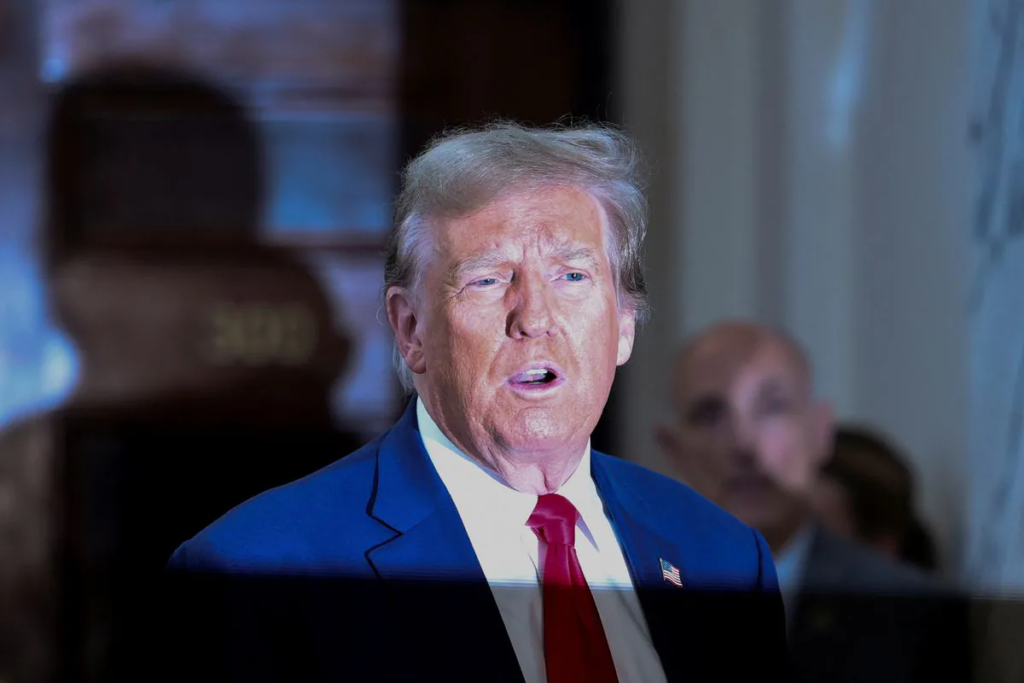The spectre of Donald Trump hangs over Davos
Peter Thal LarsenJanuary 12, 20247:00 AM ESTUpdated a day ago

Former U.S. President Donald Trump attends the closing arguments in the Trump Organization civil fraud trial at New York State Supreme Court in the Manhattan borough of New York City, U.S.,… Acquire Licensing Rights Read more
LONDON, Jan 12 (Reuters Breakingviews) – The most talked-about person in Davos next week will be nowhere near the Swiss mountain resort. As politicians, financiers and chief executives converge for this year’s World Economic Forum, Donald Trump will be 7,500 kilometres away in Iowa, starting his quest to win the U.S. Republican Party’s presidential nomination for the third time. Even so, his possible return to the White House will pervade Davos discussions on topics ranging from Ukraine, China, trade, and climate change.
Trump is not the only prominent political figure absent from the gathering, whose official theme is “Rebuilding Trust”. Previous attendees such as Indian Prime Minister Narendra Modi are also giving the event a pass, perhaps with an eye on upcoming elections at home. British Prime Minister Rishi Sunak, who is due to face the voters in the coming 12 months, is another no-show.
The 2,800 business and political leaders who have made the trip will instead hear from Chinese Premier Li Qiang, French President Emmanuel Macron, and newly elected Argentinian President Javier Milei. Secretary of State Antony Blinken and Jake Sullivan, the White House national security adviser, will represent President Joe Biden’s government. Yet the spectre of a second Trump administration will loom over many of the panels, bilateral discussions and drinks parties during the week.
Take Ukraine, whose President Volodymyr Zelenskiy is due to address attendees on Tuesday. European diplomats fear a re-elected Trump would cut off American aid supporting the country’s war with Russia and that he may follow through on previous threats to withdraw from the NATO alliance. Any longer-term decisions about providing financial support for rebuilding Ukraine or what to do with frozen Russian financial assets will also hinge on who ends up in the White House.
WEF officials hope to use this year’s gathering to explore ways to revive global trade. But any such initiative would be dead on arrival if the world’s largest economy imposed a universal tariff on imported goods, as the New York real estate mogul has threatened. Meanwhile, Trump’s return could revive tensions with the European Union, undermining the Biden administration’s efforts to lead allies in taking a tougher stance towards China, the world’s second largest economy. Global efforts to combat climate change could similarly face resistance from a president who formally withdrew the United States from the Paris Agreement in 2020, shortly before leaving office.
MISSING IN ACTION
Amusingly, the former commander-in-chief’s name is missing from the WEF’s 124-page Global Risks Report, published on Wednesday. Even so, the prospect of another divisive U.S. election campaign dominated by accusations of “fake news” – and featuring millions of voters who still believe Trump won four years ago – is probably one reason why respondents listed “misinformation and disinformation” as the most severe risk facing the planet in the coming two years, ahead of “extreme weather events”. “Societal polarization” came in third.
Trump’s electoral prospects – as well as his many legal woes – will receive a more candid airing during private discussions that will take place at the event’s hotels, restaurants and chalets. Yet business leaders thronging the corridors of the conference centre – including JPMorgan (JPM.N) chief Jamie Dimon, Saudi Aramco (2222.SE) boss Amin Nasser and Microsoft’s (MSFT.O) Satya Nadella – will have plenty of other issues on their minds too, such as the future direction of inflation, shifting supply chains, the transition to green energy, and developments in generative artificial intelligence.
Indeed, AI has displaced cryptocurrencies as the hot technology topic, with many discussions due to explore the revolutionary potential of self-teaching computer systems. It remains to be seen whether delegates will spend as much time considering AI’s impact on the livelihoods of millions of white-collar workers.
The consensus that emerges from the Davos echo chamber every January tends to be a notoriously unreliable guide to the year ahead. The gathering also has a poor record of assessing Trump. Eight years ago, delegates mostly dismissed the idea that the former reality TV star could win the 2016 election. One year later, shortly after Trump’s surprise victory, the Davos crowd persuaded itself that he would be a pragmatic leader and surround himself with capable people.
The president’s public antipathy to the forces of globalisation exemplified by the WEF did not prevent him from travelling to Davos in 2018 to tout his “America First” world view, prompting other countries to launch similar campaigns. Two years later he showed up to boast about the booming U.S. economy, weeks before the Covid-19 pandemic brought the world to a standstill.
Whether Trump visits Davos as U.S. president again will depend on American voters. Yet delegates gathering next week will find it hard to avoid discussing the possibility of a comeback. This time they are less likely to make the mistake of underestimating his chances of victory, nor the disruptive impact that will have on the world.
CONTEXT NEWSThe 54th annual meeting of the World Economic Forum kicks off in Davos on Jan. 15.More than 2,800 leaders from 120 countries will participate, including more than 60 heads of state, the WEF said on Jan. 9.
(The author is a Reuters Breakingviews columnist. The opinions expressed are his own)